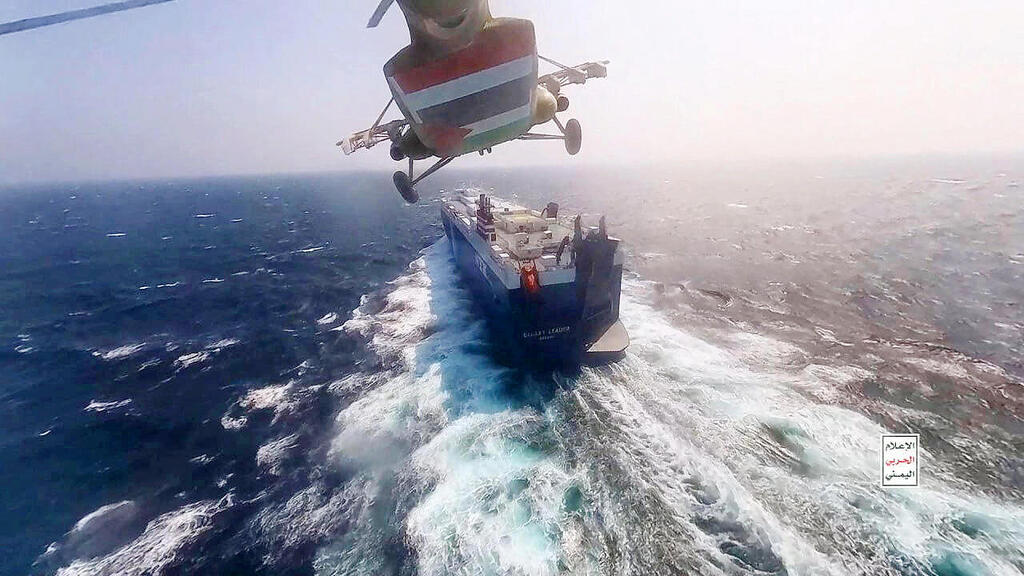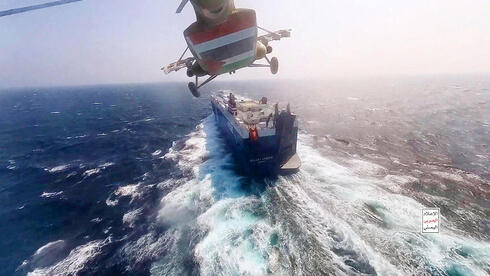
ISRAEL AT WAR
Houthi rebels pose global threat to shipping in Arabian sea
The Houthis are increasing threats on ships with Israeli connections that pass through the Red Sea and repercussions could soon be felt across the supply chain
The expected resumption of IDF operations in the Gaza Strip may put to the test the threat of the Houthi rebels in Yemen to make it difficult for ships with Israeli ties to pass through the shipping lanes in the Arabian Sea and the Bab al-Mandab strait, which connects the Red Sea with the Gulf of Aden.
The attempts of the Houthis in recent weeks to show solidarity with Hamas while launching surface-to-surface missiles, cruise missiles and suicide drones towards Israel, were successfully intercepted by the air defense systems of the Air Force, the American forces operating in the Red Sea, and the Saudi army, which are all operating in coordination in an unprecedented regional cooperation.
The frustration of the Houthis combined with the boldness and determination they have demonstrated since the beginning of the war may lead them to further offensive moves. A step to this effect was seen in recent days with a series of attacks aimed at vessels that are indirectly and partially owned by Israelis, and in a way that reawakened the maritime shadow war between Iran and Israel from about two years ago and was accompanied by offensive operations of a similar nature.
In the first case, Houthi militants took over by helicopter the Galaxy Leader cargo ship that was transporting cars owned by Israeli businessman Rami Ungar, hijacked it and took it with its 22 crew members, none of them Israeli, to the port of Hodeidah in Yemen. The ship was empty of cars. In another case, an attack on a ship partially owned by Idan Ofer was attributed to the Houthis, when an Iranian-made suicide drone hit it and caused a fire. And in the third case, which happened at the beginning of the week, American forces thwarted an attack by armed men who tried to take over another ship that is partially connected to Idan Ofer's brother, Eyal. In the background of the incident, two ballistic missiles were launched at an American destroyer that fell about 10 miles away.
The Houthi threat to expand attacks on shipping lanes in the Arabian Sea region, as well as in African countries, has economic consequences. For example, the Zim shipping company announced on Tuesday that it was taking operational precautions, while changing its shipping routes from the east to Israel. In an unusual announcement that it issued, the company explained that the changes stem from the safety risk facing vessels in the Arabian Sea and the Red Sea, and that these are, at least for now, temporary changes. These changes may extend the sailing times of its ships and even cause disruptions and delays in the delivery of goods by more than two and a half weeks.
Even before Zim's report, Israeli security and shipping officials warned that the Houthi threat could force vessels seeking to reach Israel through the Red Sea to change course and circle the entire African continent. Apart from the delays and lengthening of sailing times, this situation may make the premiums paid by the shipping companies to the insurance companies more expensive. Sources in the shipping industry estimate that even in a scenario where the insurance companies increase the premiums, these will be increases that will be absorbed in the value of the goods that the ships are transporting. An industry official said that on a ship that carries 15,000 containers and goods worth about $150-200 million, the increase in the insurance premium will be tolerable and not acute.
Related articles:
While the missile launches towards Israel constitute a military attack and a violation of sovereignty for all intents and purposes, the attacks that target ships that use international shipping lanes, and the threat to expand them, are seen as acts of terrorism that threaten the entire global maritime trade, and not just an Israeli problem.
"When the Houthis attack a ship in innocent transit through international waters, they first and foremost violate the sovereignty of the flag state that the ship carries and the sovereignty of its civilian crew members. They do not in any way harm the national affiliation of the ship's owners," said Maj. Gen. (Ret.) Eli Sharvit, a former Navy commander and currently a businessman in the field of renewable energy and the chairman of Rafael's subsidiary, DSIT, which deals in the field of defense systems for maritime infrastructures.
According to him, "Israel does not protect any property in which one of its citizens invests money only because they are Israeli. Attacking ships is an action directed at the free world and the community of nations that use the sea." He estimates that the Houthis, who are directed and equipped by Iran, direct their attacks at vessels with a close Israeli connection due to the lack of other ways to attack Israel, which is about 2,000 kilometers away from them.
"When you hold a hammer in your hand, every problem looks like a nail to you and that's what happens in this case: ships with a close Israeli connection are the most 'Israeli' thing available to them. In fact, there are no ships that sail to or from Israel, but ships that pass through Israel. The maritime trade system is based on an entire network of ports all over the world and the ships skip between them. There is no such thing as 'a ship carrying oranges that leaves the port of Jaffa with 15 sturdy Israelis on board.' However, as soon as attempts are made to target the passage of ships in the Strait of Abu al-Mandab, while deliberately harming Israeli ships in a distinct manner, then this is similar to a partial blockade of Israel and such an action will completely change the picture and take the friction to a completely different place."
Yigal Maor, who until recently served as the head of the Ports and Shipping Administration at the Ministry of Transportation, says that Israel's maritime trade is based on international companies - which reduces the ability of the Houthis to attack ships with a distinct Israeli identity. According to him, "A ship that leaves China with about 15,000 containers on board arrives at the port of Haifa, but the port of Haifa is just one stop on its way to many other ports. If the Houthis damage the crossing at Abu al-Mandab, they will damage all world trade. It will be difficult for them to know the identity of the ship, what is in each container and to whom the goods are intended and who owns them. Such attacks will arouse the world against them, because it is a crime and a flagrant violation of international treaties. However, I do not rule out a scenario in which certain parties will refuse to touch Israeli cargo on the grounds that it may endanger them."
In such a situation, the Yemeni government, which lost the capital Sana'a to the Houthi rebels as part of the civil war that has torn the country apart since 2014, cannot be a relevant address, let alone an effective one, for political moves on the part of the world. This, while on the other hand, the Houthis do not have too much to lose with their threats and actions to damage the maritime traffic of vessels in the area.
"There is boldness, determination and a willingness to take risks here that we don't know and the feeling is that they have nothing to lose and it is difficult to deter them," says Dr. Yoel Guzansky, a senior researcher at the Institute for National Security Studies (INSS), who has been studying the Houthis in Yemen for some 15 years and coordinated the handling of issues related to Iran and the Gulf states at the National Security Council in the Prime Minister's Office. He links the Houthis' attacks on Israel with the negotiations they are holding with Saudi Arabia to reach a cease-fire agreement. "Firing missiles at Israel and terrorism against ships can serve them in negotiations with Saudi Arabia by demonstrating military capabilities that equal the weight of an international powerful player and this may also serve to create deterrence against the Saudis," he said.
The Houthis' close relations with Iran and Hezbollah in Lebanon have allowed them to develop military capabilities, which enable them to launch towards Israel surface-to-surface missiles of the “Ghader" type, based on Iran's Shahab missiles, as well as the launch of cruise missiles and drones. In some cases they have achieved independent production and assembly capabilities," says Guzansky, "We underappreciated the Houthi threat over recent years, but resources are limited and Israel needs to prioritize its preparedness regarding all the threats it faces.”
Sharvit, who was commander of the navy until 2021, also says that the capabilities of the Houthis have been known to Israel for years. "To tell you that this is the first threat against which we built our military force? No. And yet, we have the tools to deal with this threat," he said.
When they come to threaten vessels passing through the Bab al-Mandab strait, which is between Yemen on the Asian continent and Djibouti and Eritrea on the African continent and is only about 30 kilometers wide, they also have at their disposal C-801 and C-802 coastal missiles. The latter was fired by Hezbollah during the Second Lebanon War in 2006 and hit an Israeli naval ship anchored off the coast of Beirut, killing four fighters.
"They have considerable naval combat capabilities and in a way that can somewhat resemble those of Hezbollah," says Sharvit. "Whoever possesses coastal missiles can inflict real damage on a vessel and also sink it. In regards to the presence of weapons on the Yemeni coast, it should be assumed that the entire Iranian arsenal is there."
Meanwhile, Sharvit sees the Houthis' moves as sporadic actions, which are used to "let off steam". However, he warns that one of the characteristics of their behavior is that they are unpredictable. "If in the past they had asked me if there was a scenario where they would launch suicide drones at Israeli-owned ships of one kind or another, I would have said that is unlikely to happen - and yet it happened. They are not so predictable and it is hard to know where it will develop. They can launch a missile at a vessel without the intention of sinking it and achieve the opposite result, because such a launch is not selective and you cannot know in advance what its results will be. I estimate that the use of such missiles will depend on the degree of escalation in Gaza and the decisions in Iran. I do not rule out this threat."
Israel, which is busy with the war in Gaza and keeping the fighting against Hezbollah below the threshold of war, has so far not responded to the Houthis' missile barrages. "They fired at Israel while undermining its sovereignty with most types of weapons at their disposal and for that they should receive an offensive response. Hezbollah fired at us and received such a response and here is a country that fires at us many times, many weapons and of all kinds and we are ashamed of our defense capabilities. This is not good enough," says Sharvit. He adds that Israel has the power to inflict painful military blows on the Houthis, despite the great distance. "You just have to make that decision," he said.
